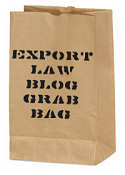![User:Abelard Fuah, via Wikimedia https://en.wikipedia.org/wiki/File:Batam_City_Mix.jpg#/media/File:Batam_City_Mix.jpg licensed under CC BY-SA-3.0 [http://creativecommons.org/licenses/by-sa/3.0/][cropped] User:Abelard Fuah, via Wikimedia https://en.wikipedia.org/wiki/File:Batam_City_Mix.jpg#/media/File:Batam_City_Mix.jpg licensed under CC BY-SA-3.0 [http://creativecommons.org/licenses/by-sa/3.0/][cropped]](https://www.exportlawblog.com/images/Welcome_to_Batam.jpg) Ling Yong Nam, a Singaporean national under indictment in the United States, will be extradited to the United States after a ruling by a court in Batam, Indonesia. Lim is accused of having arranged the shipment of radio modules from the United States to Iran.
Ling Yong Nam, a Singaporean national under indictment in the United States, will be extradited to the United States after a ruling by a court in Batam, Indonesia. Lim is accused of having arranged the shipment of radio modules from the United States to Iran.
Interestingly, Lim could have avoided extradition if he just had stayed home. In 2011, Singapore had refused Lim’s extradition relying on the dual criminality provision in the extradition treaty between the United States and Singapore, which requires that the conduct serving as the basis for extradition be a criminal offense both in Singapore and the United States. Since the unlicensed shipment of radio modules to Iran was not illegal under the law of Singapore, the dual criminality test was not met, and the extradition request was denied.
Fast forward to October 2014. Lim hopped a ferry from Singapore to Batam to attend a trade show. He was nabbed as he stepped off the ferry and has been sitting in jail in Batam ever since.
The United States has no extradition treaty with Indonesia, so the judge issuing the extradition order engaged in some creative legal reasoning to reach his decision:
The judge said he had taken into consideration the two countries’ good relations and America’s help in returning two Indonesian criminals to Indonesia.
“As a result of this, we will grant the extradition request and detain Lim Yong Nam till this extradition process is carried out,” said Judge Cahyono on behalf of the three-judge panel.
He might as well have added that he once visited Disneyland and enjoyed it immensely.

 Posted by
Posted by  Category:
Category: 

 Here are a few recent developments that you may have missed:
Here are a few recent developments that you may have missed:![The Swallows Nest by Vyacheslav Argenberg [CC-BY-SA-2.0 (http://creativecommons.org/licenses/by-sa/2.0)], via Flickr https://www.flickr.com/photos/argenberg/199746052 [cropped] The Swallows Nest by Vyacheslav Argenberg [CC-BY-SA-2.0 (http://creativecommons.org/licenses/by-sa/2.0)], via Flickr https://www.flickr.com/photos/argenberg/199746052 [cropped]](https://www.exportlawblog.com/images/swallowsnest2.jpg) The Bureau of Industry and Security (“BIS”) has issued
The Bureau of Industry and Security (“BIS”) has issued ![Cuba Capitole by y.becart(Own work) [CC-BY-SA-2.0 (http://creativecommons.org/licenses/by-sa/2.0)], via Flickr https://www.flickr.com/photos/yoh_59/13697566663 Cuba Capitole by y.becart(Own work) [CC-BY-SA-2.0 (http://creativecommons.org/licenses/by-sa/2.0)], via Flickr https://www.flickr.com/photos/yoh_59/13697566663](https://www.exportlawblog.com/images/cuba_capitol_car.jpg) The recent OFAC amendments to the Cuba embargo regulations, and related statements by OFAC, went to great pains to make clear that, notwithstanding these changes, the embargo was still in place. That being said, it is somewhat perplexing that the Cuba Assets Control Regulations have disappeared, or at least most of the Cuba Assets Control Regulations have disappeared from OFAC’s website.
The recent OFAC amendments to the Cuba embargo regulations, and related statements by OFAC, went to great pains to make clear that, notwithstanding these changes, the embargo was still in place. That being said, it is somewhat perplexing that the Cuba Assets Control Regulations have disappeared, or at least most of the Cuba Assets Control Regulations have disappeared from OFAC’s website.![By Иерей МакÑим МаÑÑалитин (originally posted to Flickr as ЛаÑточкино гнездо) [CC BY-SA 3.0 (http://creativecommons.org/licenses/by-sa/3.0)], via Wikimedia Commons http://http://commons.wikimedia.org/wiki/File:%D0%9B%D0%B0%D1%81%D1%82%D0%BE%D1%87%D0%BA%D0%B8%D0%BD%D0%BE_%D0%B3%D0%BD%D0%B5%D0%B7%D0%B4%D0%BE.jpg By Иерей МакÑим МаÑÑалитин (originally posted to Flickr as ЛаÑточкино гнездо) [CC BY-SA 3.0 (http://creativecommons.org/licenses/by-sa/3.0)], via Wikimedia Commons http://http://commons.wikimedia.org/wiki/File:%D0%9B%D0%B0%D1%81%D1%82%D0%BE%D1%87%D0%BA%D0%B8%D0%BD%D0%BE_%D0%B3%D0%BD%D0%B5%D0%B7%D0%B4%D0%BE.jpg](https://www.exportlawblog.com/images/swallowsnest.jpg) Right before the New Year, the Office of Foreign Assets Control (“OFAC”) started some of the inevitable clean-up on the Executive Order sanctioning Crimea that the agency rushed out before the President went on vacation. Not having time to calibrate the sanctions, the order just prohibited all imports and exports (except for the statutorily required exceptions for agricultural products, medicine and medical devices, which, somehow or other, became “medical supplies”). The first of these was
Right before the New Year, the Office of Foreign Assets Control (“OFAC”) started some of the inevitable clean-up on the Executive Order sanctioning Crimea that the agency rushed out before the President went on vacation. Not having time to calibrate the sanctions, the order just prohibited all imports and exports (except for the statutorily required exceptions for agricultural products, medicine and medical devices, which, somehow or other, became “medical supplies”). The first of these was 

